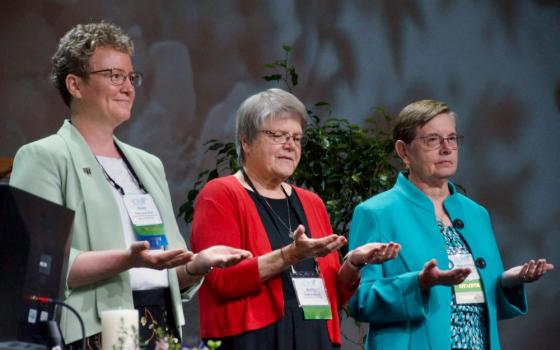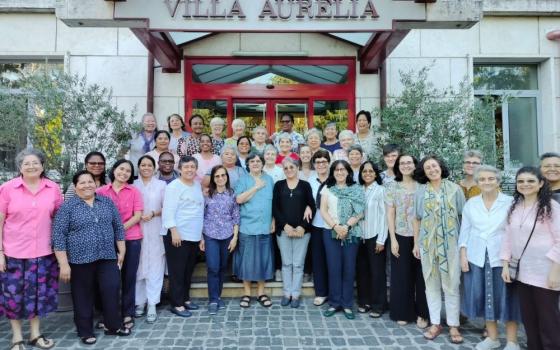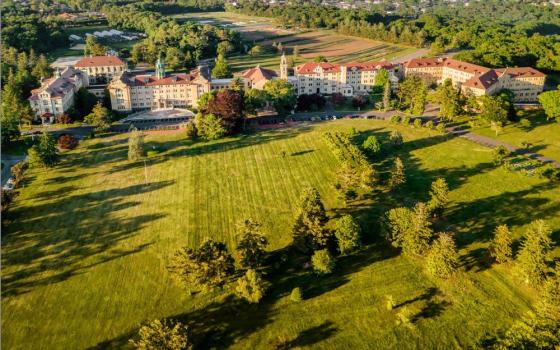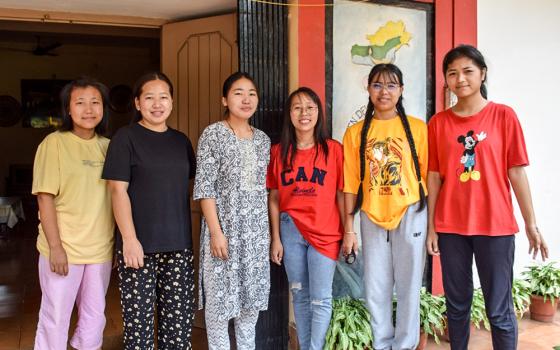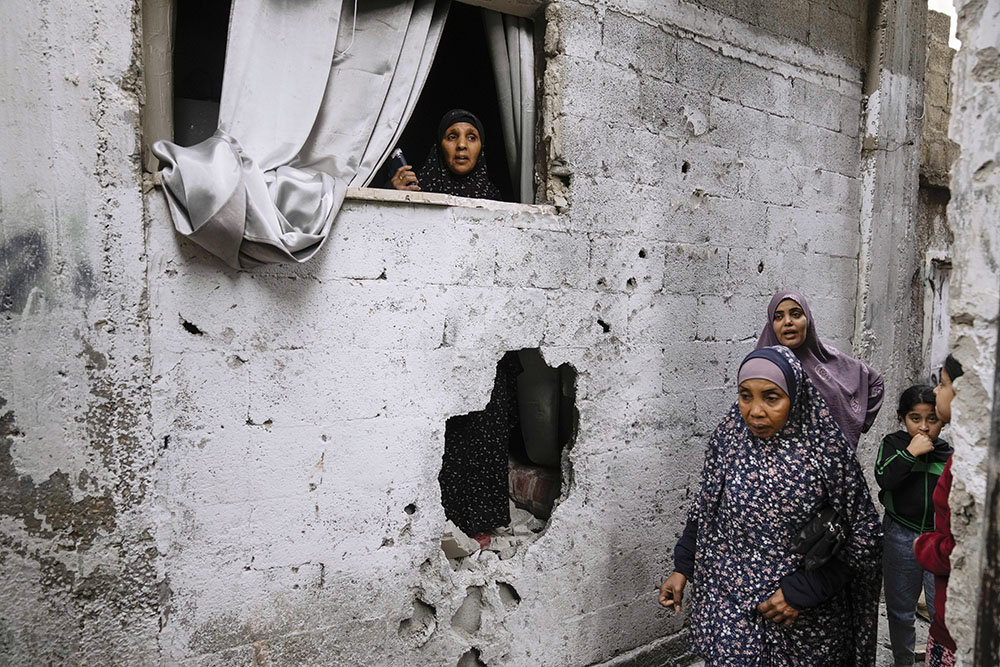
Palestinians inspect the site of an Israeli strike after a military raid in the town of Tulkarem, West Bank, Nov. 22. (AP/Majdi Mohammed)
A Catholic sister working in the occupied West Bank says while the world is focusing on the resumption of conflict in Gaza, the situation in the West Bank has worsened in recent weeks. Palestinians are being threatened and harassed by Israeli soldiers and by settlers who are donning military garb, she says.
The sister, who did not want to be identified but is not originally from the Middle East and works with a ministry for Bedouin Palestinians, says harassment and threats by settlers in particular have worsened since the Oct. 7 terrorist attacks by Hamas against Israeli citizens and with Israel's subsequent war against Hamas.
"For the people in the West Bank, it's getting worse," the sister said in a Nov. 30 telephone interview with GSR. "So many things are happening. People are afraid."
In light of the incursions, she said, people are moving elsewhere within the Palestinian territories.
"It's become too much for many," she told GSR. "It's terrible to be moving right now."
The settlers have been donning military uniforms, the sister said, based on firsthand experiences she has heard from the Bedouins with whom she and other sisters minister.
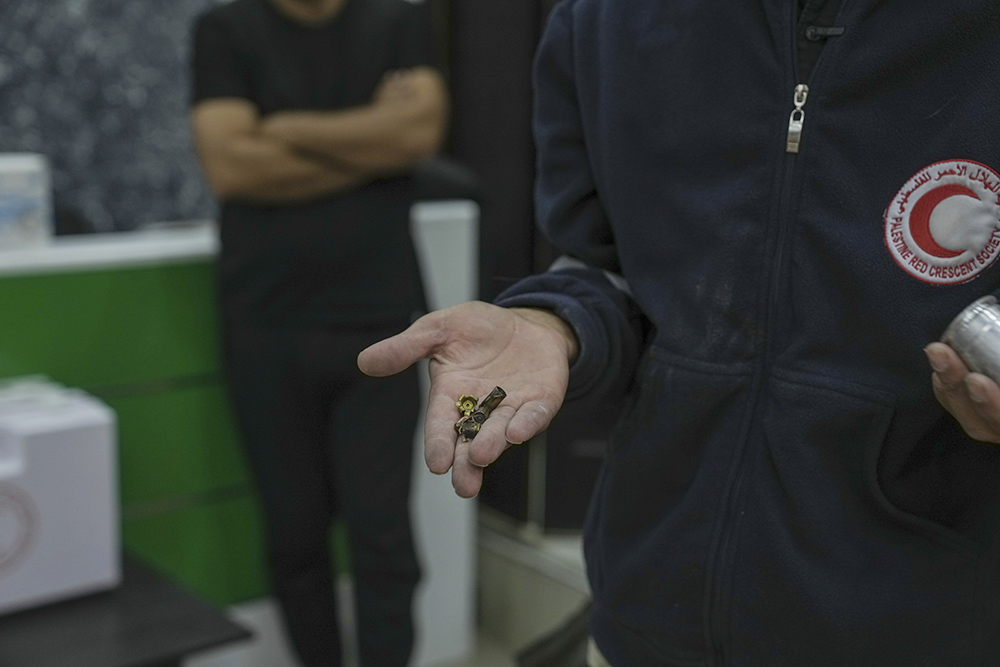
Bashar al-Qaryoute, a Palestinian Red Crescent medic, displays bullet casings that he says he has collected from attacks by Israeli settlers and soldiers on his ambulance in the village of Qaryout in the northern West Bank, Nov. 12. (AP/Mahmoud Illean)
With Palestinian human rights activists being jailed — Israel says detentions and raids are needed to deter terrorism — it has been impossible for West Bank residents to find any recourse for the harassment and raids, she said.
While Palestinians fear the Israeli military, the sister said they fear the settlers more, who she says act in violent and unlawful ways.
Roads are also being blocked within the occupied territory, making it difficult for Palestinians to go to work, either within the Palestinian areas or to cross the border into Israel. That is causing economic hardship for West Bank residents, she said.
The sister said the recent temporary Gaza ceasefire had been welcome. The Palestinians she knows have said, "We want peace, we want peace," and have condemned the Oct. 7 Hamas attacks against Israeli citizens, she said.
The West Bank residents have also felt encouraged by the presence of non-Palestinians like the sisters, as well as by Israeli citizens who have also worked with the Bedouins and provided humanitarian assistance.
But she said for there to be any lasting peace in the region, both sides will have to look beyond the present conflict. She called the ceasefire a Band-Aid that is revealing a deeper wound.
She said for the long-term conflict to end, it will be necessary for what the sister called the Israeli occupation's "systematic injustice" to stop.
Advertisement
Asked about Israelis seeking recognition of Israel as a Jewish state, the sister said lateral respect is needed on both sides, with mutual recognition of each nation's right as a state. But the sister also said she believes Palestinians believe that Israel "has the upper hand, with its military power and support from the United States."
She believes that the current situation is not good for either side, with lives being lost, Gaza under siege and both peoples suffering. "The situation is not sustainable for Palestine and it's not sustainable for Israel," she said.
One other way the current situation is harming Palestinians is that schools in the Bedouin communities have shut down because a number of checkpoints have closed roads, making it difficult for teachers to come to schools.
As a result, some schools have resorted to online lessons — though many children have no computers at home and only parents with smartphones can access the internet, and often in limited ways.
"Here, children are paying the price," the sister said.
Others paying the price are merchants who usually see an uptick in visits during the Christian holidays — now, she said, stores in cities that attract Christian tourists, such as Nazareth in Israel and Bethlehem in the West Bank, are closed.
"Tourism has stopped," the sister said, adding things are now at a standstill. "It's like the coronavirus times."
The sister also said that empowering women as peacemakers in the region could help the long-term hopes for peace — something she has seen in previous ministries in Africa and Latin America.
'Women are willing to give a hand in order to sustain peace. If anyone can do something, it's mothers, it's women.'
"Women have other ways," the sister said, noting the unity for peace among women she knows from Palestine and Israel, whom she described as "strong and resilient."
"Women are willing to give a hand in order to sustain peace. If anyone can do something, it's mothers, it's women."
Women — but also those of different faiths purposely committed to peace, said Sr. Irene O'Neill, a member of the Congregation of the Sisters of St. Joseph. O'Neill directs Sisters Rising Worldwide, a sister-run nonprofit based in St. Paul, Minnesota.
She returned to the United States immediately before Oct. 7 following meetings at Bethlehem University, where she served as a regent to the university for more than 10 years.
She told GSR in an interview that the Catholic-run university with a predominantly Muslim student body can be a model of interfaith cooperation. She said she would not be surprised if eventual peace between Israelis and Palestinians will occur because of efforts by a graduate of the university.
"I can understand there are people whose rage will take over — that there are generations of Palestinians who feel that injustices have been ignored," O'Neill said. But peace will only come when enough people of goodwill, she said, believe that two peoples will have to find a way to live together.
What has happened, from Oct. 7 onward, O'Neill said "is just horrifying" with resulting "deep, deep sadness" for Palestinians and Israelis alike.
All of this points to needed peace efforts and prayer, she added.
The sister in the West Bank said Christians globally need to pray for peace, saying God is sovereign over the region's "common sacred ground."
"Peace on Earth," she said, repeating a common holiday theme. "But with justice."

